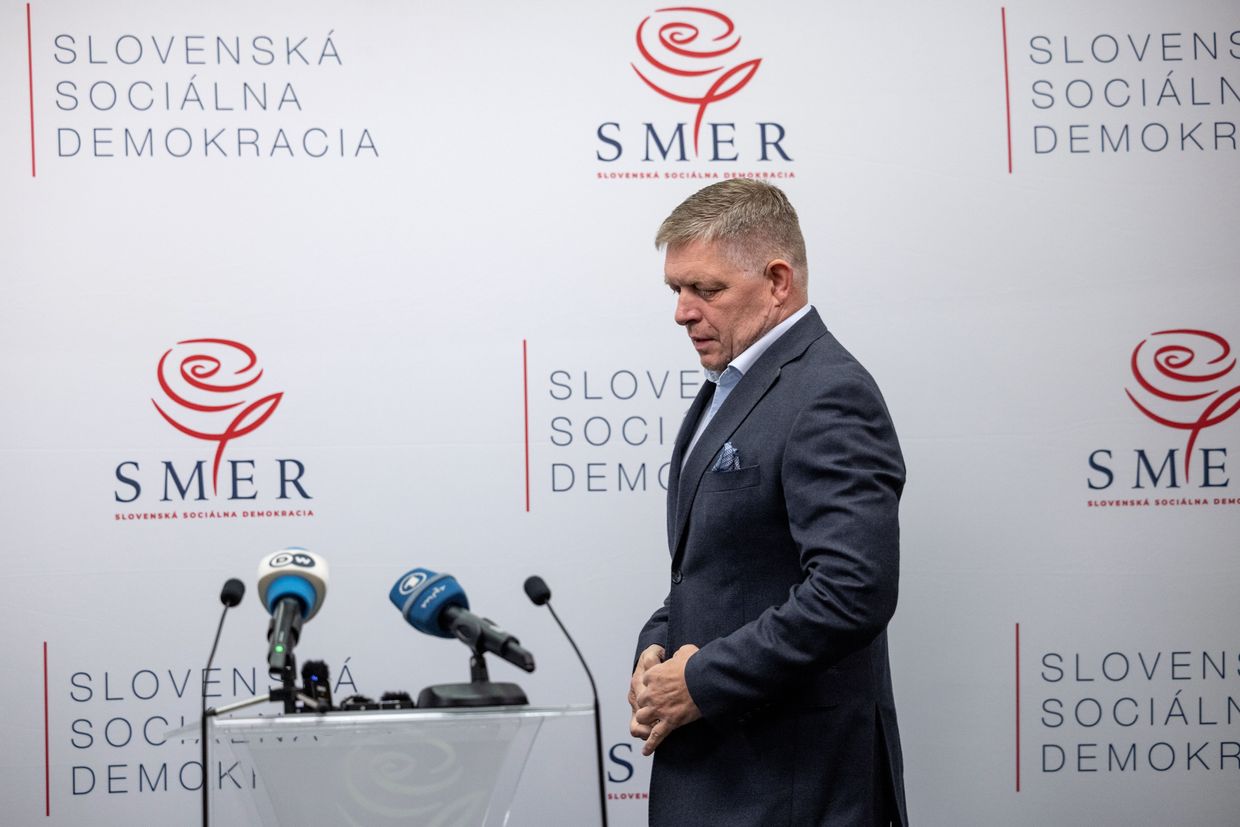Opinion: Slovak election results threaten Europe’s united front

Slovakia’s early parliamentary elections on Sept. 30 resulted in a clear victory for pro-Kremlin politician Robert Fico and his party, SMER.
While we don’t know which parties will form the government, scenarios in which Fico is not the strongest party leader of the ruling coalition are not really plausible. Therefore, it is reasonable to assume that SMER will form the government and Fico will be the next prime minister of Slovakia.
Based on these assumptions, several important implications can be drawn and discussed for Slovakia and our neighbors.
Let me start with some good news: Only two out of the six political parties that made it into parliament are openly questioning Slovakia’s foreign policy orientation.
Only SMER and the Slovak National Party (SNS) are vocally calling to cease weapons deliveries to Ukraine or the need for diplomatic solutions and peace talks between Kyiv and Moscow.
Meanwhile, the positions on Ukraine of Hlas, a political party led by Peter Pellegrini that split from SMER after the parliamentary elections in 2020, are a perfect example of fence-sitting politics, rhetorically ambivalent and hiding behind empty phrases like “Slovak national interest.”
The bad news is that these three parties have a narrow majority of 79 out of 150 seats in the parliament.
Fico’s turning point
Since 2018, when Fico’s stance on the murder of young investigative journalist Jan Kuciak and his fiancée, Martina Kusnirova, triggered his resignation as prime minister, Fico significantly reinvented his political persona.
He transformed from a pragmatic opportunist using populist social democratic talking points to charm his voters to loud, illiberal, national populist positions, building on anti-establishment sentiments and using fear, frustration, anger, and mistrust as essential voter mobilization tools.
This transformation allowed him to tap successfully into the booming disinformation ecosystem across various outlets, blogs, Facebook groups, and Telegram channels, where everything from ridiculous conspiracy theories and hardline pro-Kremlin propaganda to dangerous hate speech thrives.
The attraction was mutual, and Fico and his party SMER quickly became sweethearts of the so-called anti-establishment scene, even though Fico himself is a two-time former prime minister and SMER one of the biggest, strongest, and most influential political parties in Slovakia.
Once Washington, Brussels, George Soros, the media, NGOs, liberals, and minorities became Slovakia’s sworn enemies in Fico’s rhetoric, his U-turn was over.
Domestic turning point
Messages coming from SMER’s leading representatives during the parliamentary elections campaign give us a rather clear picture of what to expect from them once they are back in power.
There will be “changes” at the Special Prosecutor Office and National Criminal Agency as both institutions lead criminal investigations against SMER members, nominees, or closely affiliated persons in cases of corruption, misuse of public funds and power, or even the establishment of an organized crime group. This is personal for Fico, and it would be terribly naïve to think he is not coming back with revenge.

Special attention will be paid to civil rights, watchdog, transparency, and other civil society groups, as well as individual activists, independent media, and political opposition. Strategic lawsuits against public participation, a foreign actors registration act, and open threats are expected as the new normal.
Securing power by all means necessary will be Fico and his cronies’ strategic priority. Therefore, a full spectrum of the authoritarian toolkit might be seen soon, restructuring Slovak domestic politics.
Regional turning point
It is no coincidence that Hungarian Prime Minister Victor Orban was the first foreign leader to publicly and enthusiastically congratulate Fico on his electoral victory. For Orban, having Fico back in power is certainly good news.
Fico openly celebrated Orban several times as a seasoned statesman and strong leader. Their positions on Russia’s full-scale war are virtually the same. Strong criticism of sanctions against Russia, the EU’s policies on migration and energy, and anti-American accents are other linking points between the two of them.
Orban is seeking a political buddy who will be willing to help him ease the pressure from the EU and create more space for haggling over key decisions. An Orban–Fico tandem certainly has the potential to complicate further intra-EU decisions and test the Union’s unity, but their weight shouldn’t be overestimated.
The upcoming Polish parliamentary elections might be a game-changer if the currently ruling party, Law and Justice, will need the far-right party Confederacy (which is already calling for less support to Ukraine and more help to “our Polish people”) to form the next government.
The staunchly illiberal and reactionary Warsaw-Bratislava-Budapest axis would be a different problem for European politics.
Such a scenario would create an immediate challenge for Czechia, which will be forced to reorient from a very close partnership with Slovakia and an important, yet somehow complicated, relationship with Poland.
Also, there are political actors and movements in Czech national politics that will learn eagerly from Fico, Kaczynski, or Orban and might capitalize on unpopular austerity measures of the current government and struggling economy in the 2025 parliamentary elections.
History provides a clear lesson on how quickly spreading the virus of illiberal, nationalistic populism can be. Also, how dangerous it can be, especially if there is a major war in the neighborhood already.
Editor's Note: The opinions expressed in the op-ed section are those of the authors and do not purport to reflect the views of the Kyiv Independent.













